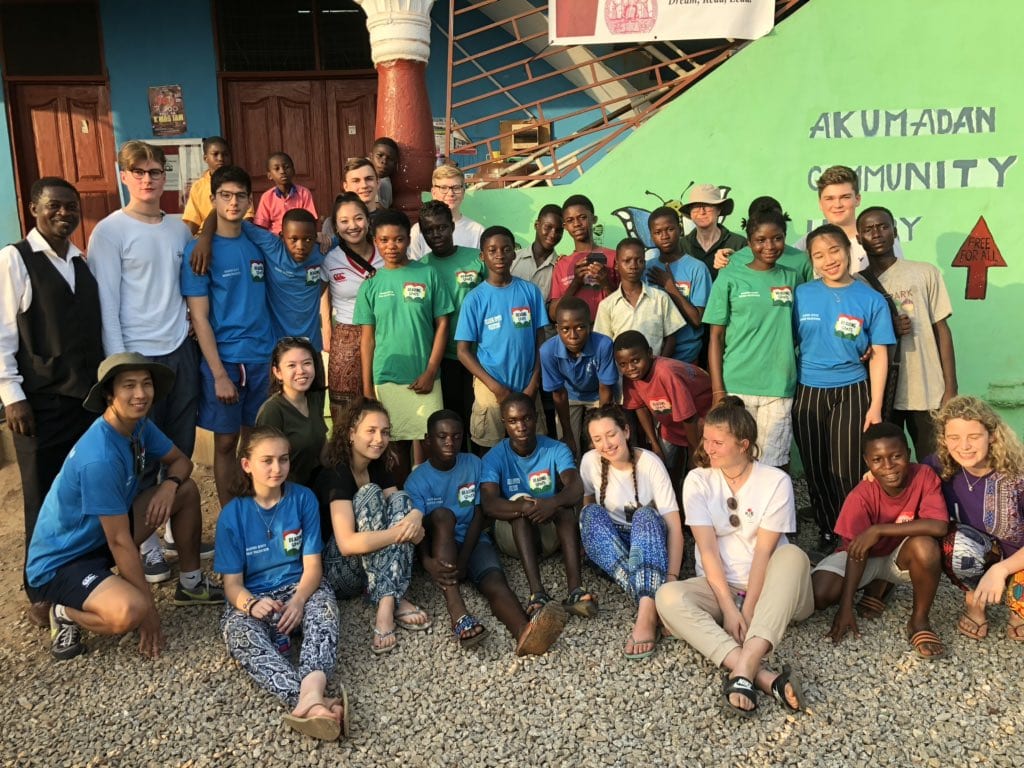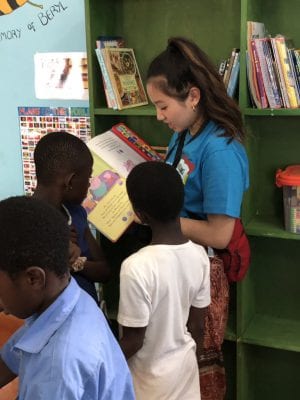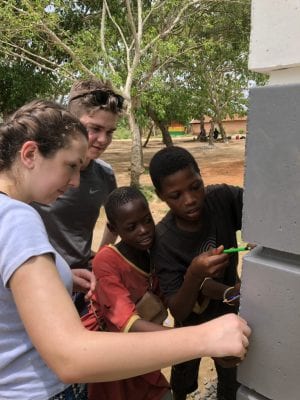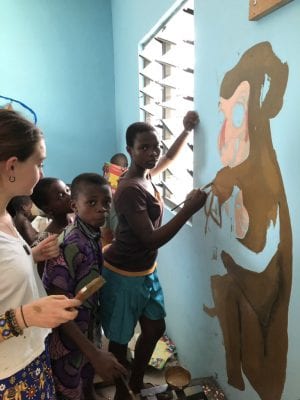During the Easter break, with suitcases packed with books and educational resources, we embarked on a trip across 5 regions of Ghana, which enabled us to learn from volunteers working in 6 different community-led Reading Spots projects, also learning about water scarcity through the work of Project Maji.
The aspect of the trip that inspired us most was the incredible number of dedicated volunteers that we encountered across the Reading Spots projects, along with the commitment and story of Francis Yebaoh, the Ghanaian Manager of the project who had visited Sevenoaks School in February and was with us for the duration of the trip. Francis’s continued commitment to the project is a testament to how much he believes in the idea that education can change lives, just as it changed his as a young boy who was given the opportunity to study in the capital.
We saw that the local volunteers play the most important role within the Reading Spots. They ensure that the project keeps on going, and are on the ground every day inspiring and teaching kids to read, running various activities, cleaning the facilities, organising the books, and helping make Reading Spots self-sustaining. While volunteers from outside the community, Francis and Miss Davison visit the projects on a regular basis to provide training and resources, it is clear that the volunteers and community leaders manage the projects effectively and with passion on a daily basis. We were surprised and inspired at how young many of the volunteers were, especially at the Akumadan spot, and also had the chance to meet committed volunteers from Elmina who travel across the country fitting solar panels onto the projects for free.
 We spent a day in Accra at the start of the trip, and had the chance to visit James Camp Prison, a prison for young offenders in the capital. We were shocked to learn that roughly 50% of the prisoners were illiterate and were able to ask Tina, the Prison Manager and Education Officer, a range of questions relating to their crimes, educational opportunities, and the rehabilitation process. We contributed some resources prison’s education centre and we hope to raise funds to help renovate to make a more appealing space in the future. We also visited a robotics day at the newly built Academic City university where we met the inspiring Gertrude, one of the Reading Spots youth changemakers who has created her own project in her remote village in Northern Ghana, before meeting Nana Damoah, a well-known Ghanaian author and publisher who gave us a reading of his work and offered us some understanding of the educational context in Ghana.
We spent a day in Accra at the start of the trip, and had the chance to visit James Camp Prison, a prison for young offenders in the capital. We were shocked to learn that roughly 50% of the prisoners were illiterate and were able to ask Tina, the Prison Manager and Education Officer, a range of questions relating to their crimes, educational opportunities, and the rehabilitation process. We contributed some resources prison’s education centre and we hope to raise funds to help renovate to make a more appealing space in the future. We also visited a robotics day at the newly built Academic City university where we met the inspiring Gertrude, one of the Reading Spots youth changemakers who has created her own project in her remote village in Northern Ghana, before meeting Nana Damoah, a well-known Ghanaian author and publisher who gave us a reading of his work and offered us some understanding of the educational context in Ghana.
The first community we visited was Ekoso, Francis’s own community, a rural farming community in the Eastern Region of Ghana. Through our fundraising prior to the trip, we had supported a Project Maji solar-powered water pump and part-sponsored the creation of a community ‘Reading Spot’ – a community-led education centre, filled with books and educational resources, to be shared for free by all in the community. We visited the community alongside a group of students from the Happiness Project at Academic City University in Ghana who had also collected a huge number of books and resources for the project.
Seeing the government school in Ekoso, consisting of so few desks and chairs for the children, barely any educational resources and such basic learning conditions, it was clear that it must be such a disadvantage for the children to work. The blackboards were so unclean and broken it was very difficult to understand anything written on them. A teacher we spoke to, said that 4 or 5 children sit on one tiny bench and therefore they spend the lesson time shoving each other and fighting rather than paying attention to class and learning. The teacher explained it is almost impossible to teach like this. The Junior High School consisted of a shipping container in serious disrepair; the teachers explained that it was so hot inside that they instead opted to teach pupils under nearby trees. The Reading Spot which we helped to stock and paint alongside community members therefore provides educational resources which helps teachers to explain certain things visually to the children. Also after school, during evenings and weekends, it provides a place which can be used for a quiet study space, with solar power enabling a stable source of electricity at night in a community that often has power outages. The commissioning ceremony certainly enabled us to see the extent of the value that the community placed upon the two projects.

Water is also necessary for every aspect of life and also has a strong connection with educational success. Young girls are normally sent out at extremely early hours in the morning to fetch water for the coming day. By going out so early they are not only put at risk, but tired and run down which takes a toll on their performance at school. This water collected would also normally be from an unclean river (which we visited) which provides serious health risks, which can also remove children from school due to illness and recovery. We hope that with the creation of the new Project Maji water station that provides water on tap, rather than through a pump, they will be able to spend this additional time enjoying the benefits of the Reading Spot. The moment that the water was turned on in this commissioning ceremony was certainly surreal: something that we had completely taken for granted was now available to this community for the first time.

Another area we visited was Akumadan in the Ashanti region, which was a two storey Reading Spot created in 2016, run by a huge team of local volunteers who we helped to clean and paint the facility alongside. The volunteers in Akumadan (Adu and James mainly) inspired us so much as they have dedicated this part of their life to help others and their community with so little in return. For them, the reward of helping children educationally is enough to drive them onwards. We learnt that life is not about money and success, it is about being happy and satisfied with the work you do. They are only 20 years old, very similar to our ages and they have made such a large impact on their community.


Every teacher we met was a real inspiration. At Messiah International School, a very low-cost private school which houses the first Reading Spots project (which was meticulously kept with an active and creative readers’ club), we also sat in a maths lesson where the teacher Dennis, who was not far in age from us, was explaining plane shapes. We were truly inspired and impressed at the clarity of explanation, kindness and humour that he gave to the class. Later on in the day a boy said that his favourite teacher was ‘Sir Dennis’ which showed to me that although working with children sometimes gets draining, by being kind and generous, people will always look up to you. Dennis led the use of recently provided Dext Technology science sets in the school and wider community, and we were treated to an impressive display of science experiments by a 11 year old boy nicknamed ‘Prof’ due to his exceptional academic ability, before also put to the test by a young girl called Yulanda whose knowledge of human anatomy far surpassed our own. She spoke of her (very serious) ambition to become the first female President of Ghana.

After an impressive surprise commissioning ceremony in Bosomadwe, right at the end of the trip we visited Elmina, a fishing town overshadowed by Elmina Castle, where we were able to learn about the impact of the slave trade and colonial rule. We interacted with pupils at Edinaman Senior High School and also visited the site of a new Reading Spot that we hope to create through fundraising as a group in the months ahead in a nearby area called Pershie. We were able to meet several community members already leading additional evening classes and reading sessions but without sufficient space and resources. In particular, we learnt that the teenage pregnancy rate in the area was a shocking 40% – one factor that the community leader mentioned as contributing to this was the lack of a safe space with light to study with educational resources in the evening.
Ghana’s amazing warmth, hospitality and forgiveness regarding the slave trade was humbling to see and experience. Ghana’s slow pace also has made us want to slow our lives down, though that may be a bit hard. It also really struck us how impermanent everything many of the people from these remote communities have. Even their houses fall down or flood when it rains – similar thunderstorms in Singapore which can happen without you even knowing as you hide away at home or in a mall, oblivious, are devastatingly destructive in Ghana.
And how has the experience changed us? Some reflections..
‘This experience has definitely changed the way I see global inequality. It has never been so apparent to me how much we have and how little others have, as often you don’t think beyond your own country in terms of relative poverty. Absolute poverty is very different, and for the first time, I now see how working hard does not equate to success. It feels very hopeless to know that many Ghanaians might never lift themselves out of poverty, or have the opportunities we have, no matter how hard they work or how hard they study.’
‘The government just does not currently create a conducive environment for employment for all and upward social mobility. This makes me want to do something in the bigger picture, to somehow understand what can be done from the top down that will create a freer environment.’
‘We also realised how many of our actions in the UK setting do have connections to the conditions and opportunities experienced in Ghana – for example, I will think a little more about the products we buy, and consider options such as Fairtrade products.’
‘It seems ridiculous to us that a large percentage of the world live in this way, and I was completely blind to it. After seeing how so many people live in Ghana, the inequality between MEDCs and LEDCs is so large. It isn’t fair.’
Written by the Ghana pupil team

 Reading Spots supports the creation of community-led solar-powered shared education centres in rural areas of Ghana. Since December 2015, we have created 30 Reading Spots projects run by over 200 local volunteers. We also run youth and teacher changemaker programmes which offer individuals grants and training to lead education projects in their home communities. The project won the Tes International Award in 2018 for the best global learning project in UK schools – the project also aims to educate UK pupils about sustainable development through online courses, conferences, participation in fundraising and book drives.
Reading Spots supports the creation of community-led solar-powered shared education centres in rural areas of Ghana. Since December 2015, we have created 30 Reading Spots projects run by over 200 local volunteers. We also run youth and teacher changemaker programmes which offer individuals grants and training to lead education projects in their home communities. The project won the Tes International Award in 2018 for the best global learning project in UK schools – the project also aims to educate UK pupils about sustainable development through online courses, conferences, participation in fundraising and book drives.
Pupils at Sevenoaks School support the project on a weekly basis through the service programme, working on project design, social media, communications, fundraising and organising book collections. To donate to the Reading Spots project, visit www.justgiving.com/reading-spots or contact Miss Davison (Founder/Chair) for further information. Also see www.readingspots.org or follow us on social media on Twitter and Facebook @readingspots.




